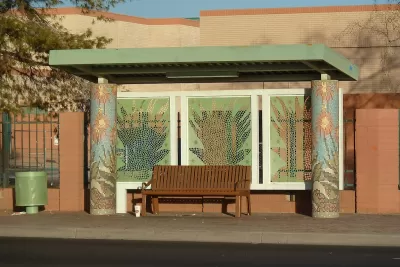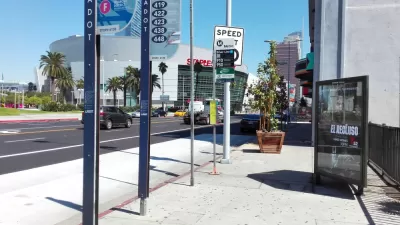The city’s updated Shade Master Plan calls for trees and built structures at bus stops to protect residents from heat.

A “shade plan” developed by the city of Phoenix takes aim at extreme heat with street trees and “engineered shade” to protect residents at bus stops and in other public spaces. As Ysabelle Kempe notes in Smart Cities Dive, “The recently approved plan is an update and expansion of Phoenix’s 2010 Tree and Shade Master Plan.”
The new plan takes a more focused approach to shade, targeting bus stops first. The new approach comes in part as an admission that the city can’t afford to meet its initial blanket goal of shading 30 percent of Phoenix by 2030, but also refocuses efforts on communities that currently lack shade infrastructure. According to Jacob Koch, who helped the city create the plan, “We want to increase the canopy in the places that need it most and that have not had the same level of investment and public infrastructure, historically.”
According to Kempe, “City officials in Phoenix know that more must be done to increase shade beyond the actions outlined in the plan. The document specifically calls out the need to secure more sustained funding sources for this work and to improve the budget and practices for maintaining trees and built shade structures.”
FULL STORY: Not just trees: Phoenix’s $60M shade plan includes built structures, too

Planetizen Federal Action Tracker
A weekly monitor of how Trump’s orders and actions are impacting planners and planning in America.

Restaurant Patios Were a Pandemic Win — Why Were They so Hard to Keep?
Social distancing requirements and changes in travel patterns prompted cities to pilot new uses for street and sidewalk space. Then it got complicated.

Map: Where Senate Republicans Want to Sell Your Public Lands
For public land advocates, the Senate Republicans’ proposal to sell millions of acres of public land in the West is “the biggest fight of their careers.”

Maui's Vacation Rental Debate Turns Ugly
Verbal attacks, misinformation campaigns and fistfights plague a high-stakes debate to convert thousands of vacation rentals into long-term housing.

San Francisco Suspends Traffic Calming Amidst Record Deaths
Citing “a challenging fiscal landscape,” the city will cease the program on the heels of 42 traffic deaths, including 24 pedestrians.

California Homeless Arrests, Citations Spike After Ruling
An investigation reveals that anti-homeless actions increased up to 500% after Grants Pass v. Johnson — even in cities claiming no policy change.
Urban Design for Planners 1: Software Tools
This six-course series explores essential urban design concepts using open source software and equips planners with the tools they need to participate fully in the urban design process.
Planning for Universal Design
Learn the tools for implementing Universal Design in planning regulations.
Heyer Gruel & Associates PA
JM Goldson LLC
Custer County Colorado
City of Camden Redevelopment Agency
City of Astoria
Transportation Research & Education Center (TREC) at Portland State University
Camden Redevelopment Agency
City of Claremont
Municipality of Princeton (NJ)





























